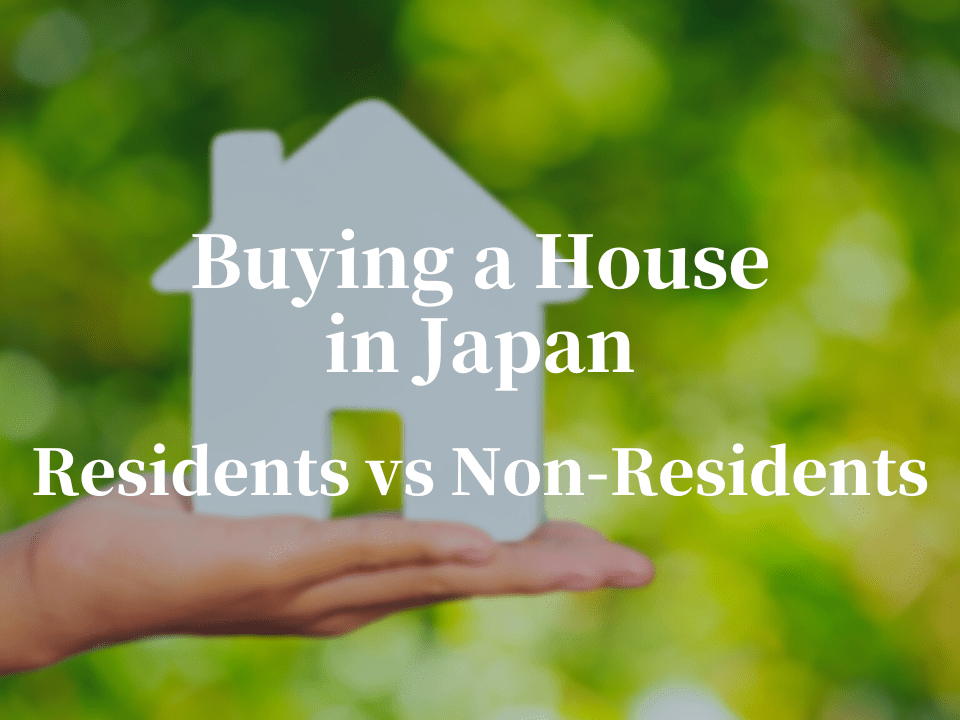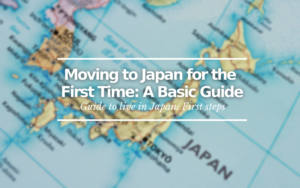Buying a House in Japan: For Residents and Non-Residents
Residents vs non-residents: Differences when purchasing real estate

Are you interested in buying a house in Japan?
Real estate purchasing is a big deal, so obviously there are many doubts and questions that come along with this idea.
- How can I buy a house in Japan as a foreigner?
- Are there differences if I’m a resident of Japan as opposed to a non-resident?
- Is it even possible for me to buy a property in Japan?
These are all valid questions you might be thinking of. In this article, I will answer all of these questions as well as explain to you some of the basics and possible problems you might face when buying a house in Japan.
*Please note that this article contains affiliate links.
Buying a House in Japan
Before going into the details of the requirements of purchasing real estate in Japan and the differences between being a resident vs a non-resident, let me show you some basic points about buying a house in Japan. These points might be different in comparison to buying a house in your home country.
First, when buying real estate in Japan, in most cases, it has to be done through an entity that is qualified to be an intermediary between the seller and the buyer. In most cases, the real estate agent will do this. So, to make a real estate purchase directly with the seller is almost unheard of in Japan. The purpose of this is to avoid any possible problems during the transaction process. The fee for this intermediary agent is divided by both the seller and buyer.
In other countries, each side(buyer and seller) will have its own agent plus a broker that will be the intermediary. However, in Japan, there is only the intermediary broker.
However, as I mentioned above, this happens in most cases, meaning that there are exceptions such as when buying a newly constructed apartment room.
Another point that is different compared to other countries is how information about properties for sale is managed. In many countries, information about all properties for sale can be found in a single database. However, in the case of Japan, this information can is scattered in different databases such as the REINS (Real Estate Information Network System) or private real estate portal sites.
Requirements for foreigners to purchase real estate in Japan
As I mentioned in the intro of this article, one of the first things you might be asking yourself when considering buying a house in Japan is the requirements as a foreigner. Is it even possible for foreigners to purchase real estate in Japan?
The quick answer is yes. In most cases, purchasing real estate (whether that is a house or a piece of land) in Japan has the same requirements no matter if you’re Japanese or not as long as you have the necessary funds to make this purchase. There are many countries that have regulations that make it difficult for foreigners to buy property abroad, but that is not the case in Japan. You don’t need to have permanent residency or a specific type of visa for that matter. Also, proprietary rights have no expiration date, and real estate properties can be bought, sold, and inherited freely.
However, one important thing to be aware of is that purchasing a real state property will not give you the rights to permanent residency or a visa.
As I mentioned above, this is in most cases. In June 2021, a law that regulates the purchase of properties in Japan was established. This involves purchasing properties near military bases, nuclear power plants, and other kinds of locations that are designated as “important facilities”. This is also the case with remote islands that are near the border.
Another important thing to keep in mind is the taxes that come when purchasing the property as well as the paperwork required for inheritance purposes are also the same whether you’re Japanese or not.
The only difference that can occur when purchasing a house as a foreigner is the required documentation. I will explain this further on.
General flow when buying real estate in Japan
Although very simplified, the following is the process when buying real estate in Japan.
1. Search for a real estate broker: You can contact a real estate agent or you can use a website. This is a very important part. (I will explain later on).
2. Find the house you want: Once you have found a real estate property that you like, schedule to visit the property to make sure it is what you’re looking for.
3. submit the purchase application form: After visiting the place and you feel sure about wanting to proceed, the next step is to apply for the property. You need to fill in your offer price, payment method, the contract date, etc.
4. Sign the contract: After you and the seller have agreed to all the terms, it is time to sit down and check all the details of the contract as well as the “Explanation of Important Matters” which is another document required here. If everything is good, you can sign the contract.
* After this, if necessary, you can apply for a home loan. There is also the final check where you and the seller will go to the property to do a final check to be sure that everything is as indicated in the property report.
5. Closing and transfer: This includes ownership transfer application, payment of the remaining costs, and settlement of fixed asset tax, among other remaining details.
Differences between residents and non-residents of Japan
Now that we are clear about the general flow when buying real estate in Japan, let me explain the difference that occurs between being a resident of Japan vs a non-resident of Japan.
Simply put, there is only one main difference which is the required documentation. If you are a resident of Japan, it is way easier to gather these documents since these documents are not difficult to get. However, in the case that you’re not a resident of Japan, then you will need to get documents that will replace these Japanese documents that can only be prepared in Japan for residents.
This is where things can get really difficult, especially if you don’t hire a real estate agent that has experience with non-residents of Japan. That is why it is really important to find the right agent or broker.
The following are the documents required for purchasing a house in Japan as a resident of Japan vs a non-resident of Japan.
Residents
- Certificate of residence (住民票)
- Residence Card or Special Permanent Resident Certificate (在留カード, 特別永住者証明書)
- Seal (印鑑)
- Certificate of seal (印鑑証明書)
- Identification documents (本人確認書類)
Non-residents
- Affidavit (宣誓供述書)
- Identification documents (本人確認書類)
As you can see above, some of the documents required for residents of Japan can not be found in other countries such as the seal and certificate of seal. If you are a resident of Japan, this is really easy to get, but in the case of non-residents of Japan, in most cases, you won’t have this (since having a seal is really uncommon out of Asia). So to replace this, you will need to get a certificate that demonstrates and verifies your signature. Even more, this certificate needs to be translated into Japanese. That is where the affidavit is necessary. This serves as proof of address as well as signature.
Regarding the identification documents, this can be your driver’s license or passport.
Another difference between being a resident and a non-resident, although not officially, is the scheduling. If you are a resident, then you can take all the time in the world to go through all the steps for buying a house. However, if you’re not a resident, this means you need to be really efficient and meticulous when planning your visit to Japan, since you’ll have limited time. This is another important reason to find the right real estate agent or broker.

Living Japan offers useful services to make the purchase/renting experience as comfortable for you as possible.
You can inquire about properties listed on other real estate websites such as SUUMO and HOME’S. You can get everything done online (from room searching, room tours, and even contract procedures). Living Japan also offers to help you to set up utilities such as electricity, gas, and water.
Their website is available in English, Chinese, and Korean.
▶Official Website: https://www.livingjapan.com/
I hope you enjoyed this article. If you want to know more about renting an apartment in Japan, go check the following articles for more info!
▽Related Articles▽
▼Editor’s Picks▼
Written by
Born and raised in Costa Rica, I started living in Tokyo from college. I love traveling within Japan & around the world. Since I wasn’t born in Japan, I know the cultural impact that you can get when visiting Japan for the first time and what you might be worried about before your trip. And I’ve lived long enough to somewhat understand the nuances of the Japanese culture that make this country such an attractive place to visit. Hopefully I can provide to you both the information you’re looking for and the information you didn’t know you needed to know.

















